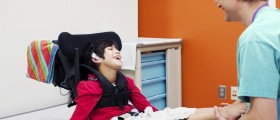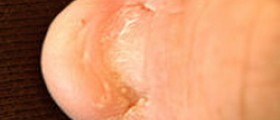
Down syndrome is a condition medicallyreferred to as trisomy 21, due to the fact that it is caused by agenetic problem affecting the 21st chromosome,manifesting through 3 chromosomes on this pair instead of 2.
This additional genetic materialpresent on the 21st chromosome is blamed for many mental and physical formsof impairment which characterize this condition. Many factors canlead to Down syndrome, the most common being the age ofthe mother. Basically, the older the mother is, the greater thechances of her giving birth to a baby with Down syndrome are.
Teenagers with Down Syndrome
Teenagers suffering from this disorderare bound to encounter numerous problems during this phase of growingup. Namely, apart from being shorter than most of their peers andaverage adolescents for that matter, their head usually looks smallerand more round, with the back of it being flat. Furthermore,teenagers with Down syndrome have flat noses, short necks and smallears, with an upward slant on the eyes, decreased level of musclestrength and a mental impairment which can be anything from mild toserious.
Moreover, teenagers with Down syndromeare more prone to developing certain diseases such as leukemia, heartdisease, spinal and cervical problems, hypothyroidism or celiacdisease, making them intolerant to rye, oats and barley, as well aswheat, having a serious impact on their nutrition.
In most cases, Down syndrome isnoticeable immediately after a the child is born, due to the presenceof the above mentioned physical signs. Once this condition isfound to be present, the affected children are assessed and examinedmedically, in order for the syndrome to be classified anddiagnosed completely and thoroughly. Numerous health experts may beinvolved in the process, including cardiologists, orthopedicsurgeons, neurologists, psychologists, physical and occupationaltherapists and many other health experts.
However, some problems related to Downsyndrome are bound to appear later, during adolescence, when the bodystarts undergoing countless changes, due to hormone fluctuations.During this stage, Down syndrome teens may encounter many problemsinvolved with their education, social relationships, work and manyother factors they might stumble upon on their way to adulthood.
So, they need assistance throughouttheir teenage years. While Down syndrome teenagers who suffer frommild levels of mental problems may go through this period just fine,requiring nothing but minor guidance, some individuals who suffer from severemental impairment may need all the help and assistance they can get.
Furthermore, Down syndrome teenagerscannot participate in sport events due to their short stature, muscleproblems and some of their other physical limitations. Instead, theyare commonly allowed to take part in Special Olympics and similarevents, which can make them feel abandoned or rejected by their peersand teachers.
Even though contact with other childrenat school can be beneficial for Down syndrome patients, this can alsolead to problems in social interaction.
When hormones start reaching theirpeek and the sexual desires in teens with Down syndrome startescalating, these individuals need to be taught about the importanceof contraception as well as the dangers related to suffering fromsexually transmitted diseases. Females who suffer from this geneticdisorder are likely to give birth to children with the same problem.Additionally, mothers with Down syndrome will have a hard timeraising their children, due to all the impairments their conditionbears.
Thus, Down syndrome in teenagers canlead to various social, emotional, physical and psychologicalproblems, making life harder for these teenage individuals,especially if their genetic condition is severe.
Maternal Age Complications
Due to all the possible complicationswhich might stem from this condition, Down syndrome individualsshould undergo annual physical and mental examinations and screening.
Since these people are more prone tosuffering from many different forms of illnesses, their propernutrition is crucial. Additionally, they should be very careful abouttheir body weight since the lack of physical activity, being a commonscenario in Down syndrome patients, can lead to obesity, which onlyfurther jeopardizes the health of these individuals.
As women suffering from this conditionreach their maternal age, the risk of them becoming pregnantincreases. It is important to be careful about this possibility sincein about 25% of cases, pregnant women with Down syndrome give birthto stillborn children or experience a miscarriage. Furthermore 70% oftheir pregnancies end in trisomy 18 and 13.
In general, women who do not sufferfrom Down syndrome increase their chances of giving birth to childrenwith this problem as they grow older. In fact, if the mother is olderthan 39, she faces a 1 in 137 chance of giving birth to a baby withchromosomal abnormalities. Also, if the woman has Down syndromerunning in her family, or has previously given birth to children withDown syndrome, she should have her pregnancies medically monitored oruse a donor egg in order to avoid another occurrence of Down syndromein her family.

















Your thoughts on this
Loading...